
Health and medical care in Bali
Bali is a popular holiday destination for Aussies and it’s not hard to see why, with its tropical climate and beautiful beaches. Despite this, it’s important to keep in mind that Bali isn’t a first world country and some basic things like food and drinking water might not be up to the standards you’d expect.
We have compiled some handy tips for travellers so that you get the best healthcare, or even better, avoid any medical issues in the first place.
Key health considerations for Bali
Vaccinations
There are no mandatory vaccinations for Bali, but the World Health Organisation recommends Tetanus, Hepatitis A and B, Typhoid and Rabies. It’s important to see your doctor 6-8 weeks in advance of your trip to make sure you’ve got all the necessary vaccinations before you go. You may be required to take extra precautions depending on what activities you’re doing and what regions you’re visiting.
Hygiene
The tap water in Bali isn’t recommended for drinking, so avoid it and stick to sealed bottled water. That includes steering clear of more than you might think, including ice in drinks, brushing your teeth with tap water, ingesting water in the shower, and food that has been washed in tap water.
You’ll need to drink plenty of bottled water to stay hydrated in Indonesia’s hot and tropical climate, especially if you’re directly exposed to the sun.
Diarrhoea is a common problem in Bali, but washing your hands regularly and following a few food guidelines can help you stay healthy:
- If you’re buying food from markets, stick with fruit that can be peeled or washed with bottled water.
- Check any meat to ensure it’s well cooked, especially chicken.
- If you’re not near the sea, avoid seafood because there’s a good chance it won’t be fresh.
- Finally, try to avoid too much spicy food if you’re not used to eating it regularly at home.
There’s no guarantee you’ll avoid ‘Bali belly’ completely, but having some common sense and practicing good hygiene is your best bet. Trust your gut!
Stray dogs and wild monkeys are common in Bali and while they’re cute, don’t approach them or touch them. Not only can they be unfriendly, but many carry rabies. If you do touch one of these critters, wash your hands immediately and don’t touch your face or food until your hands are clean.
Washing your hands regularly and using hand sanitizer will help to prevent you getting sick. If you do get sick, however, make sure you seek medical attention, especially if symptoms persist or if you have a temperature that continues to rise.
Hospitals
There are clinics and hospitals throughout Bali and many have English-speaking doctors. Keep in mind that Bali is not a first-world country, so the standard of care may not be what you’re used to at home, particularly in more remote areas.
In some clinics, the patient is expected to provide their own meals and clean clothing, while others have been known to extort tourists on occasion with expensive bills.
What to do in an emergency
If you need an ambulance and you don’t have anyone who can translate for you, call 118 and say ‘ambulans, silahkan’ (‘ambulance, please’) and clearly say your name and location to the operator.
Once you reach the hospital, you may be required to provide proof that you have travel insurance before you are treated. Keep a copy of your policy number on your phone or in your day bag, in case of an emergency.
Be prepared
Keep a list of your prescribed medications and known medical conditions in a handy place - in case of an emergency, this will be one of the first questions you will be asked by a medical professional.
How we can help
If you need to be admitted into a hospital, require a surgical procedure or treatment, or think your medical expenses are likely to exceed $2,000, you or someone acting on your behalf will need to contact Southern Cross Emergency Assistance for prior approval as soon as possible on +61 2 9191 1180.
We will be able to review your claim, organise emergency evacuation if necessary, provide the hospital with a payment guarantee so you don’t have to pay up-front (subject to you meeting the terms and conditions of your policy), and keep your family back home informed of your situation. Keep hold of your receipts and any doctor’s notes as we will need to see these alongside your claim.
If you need to visit a GP for a minor medical reason, you don’t need to contact Southern Cross Emergency Assistance. Instead, simply pay your account and claim.
If you need specialist treatment (including physiotherapy and chiropractic treatment) you must get a referral from a registered medical practitioner.
In some cases, a large deposit will be required before you receive any care. When you’re discharged, always ask for a medical report and any receipts to help with making an insurance claim.
If you’re unsure about the standards of care or where to go for treatment, contact us and we can help you out.
Medication
If you are taking medication with you, make sure you have enough for your entire journey. You should also take a prescription or doctors note with you to prove that the medication has been prescribed to you, otherwise it might be confiscated by customs. Bali has extremely strict laws around drugs, so it’s worth being very careful around your prescription medication and documentation so you don’t find yourself in hot water!
It’s also important that you make sure your medication is in its original packaging so that the authorities can confirm it matches your prescription.
Before you go
Many of our claims are for medical problems or delays caused by medical problems.
If you are feeling unwell before you leave home, make sure you see a doctor. They can give you a professional recommendation on whether or not you should be travelling.
If there are any changes to your medical conditions, or a new illness or injury arises before you depart for your trip (or in between journeys if you have an annual policy), you must email us or call us on 1800 196 484 so we can let you know if we are still able to offer cover and if so, whether an additional premium applies.
Health warnings
From volcanoes to virus outbreaks, it pays to be in the know. You can keep up-to-date on any global health warnings through the World Health Organisation (WHO). A large section of their website is dedicated to the precautions you should take when travelling.
Smart Traveller also provide advice on medical care in Indonesia, and allow you to register your travel and contact details in the event of an emergency.
Common claims
Gastro bugs or ‘Bali belly’
We get a lot of claims for gastro problems. It has even coined its own term, ‘Bali belly.’ The commonality of this is due mostly to the exotic nature and sometimes questionable sanitation of the Balinese food.
We recommend taking precautions with food, always washing hands before eating, and sticking to larger or more commercial restaurants whenever possible. If you have any doubts about a certain restaurant, check TripAdvisor and read reviews from fellow travellers before you go there.
If you are new to this type of cuisine, take it in little steps and don’t go overboard on spicy food if it’s not something you wouldn’t eat often at home. Remember: boil it, cook it, peel it – or forget it!
Animal bites
Animal bites are common in Bali, mostly from stray dogs or wild monkeys. While it can be an amazing experience seeing these monkeys in the wild around temples and rainforests, bites aren’t fun and they can become infected. Remember, don’t get too close to any wild animals overseas and don’t make contact, no matter how cute they are.
Water worries
Bali is a popular destination for surfers and beachgoers, so it’s not surprise that we receive a lot of claims for ear infections and coral cuts. If you’re planning on doing a lot of swimming or surfing, it’s worth taking some ear drops with you as a precaution and rinsing your ears and face with clean water after swimming.
Keep an eye out when you’re in the water and whenever possible, stay well clear of rocks, coral or other hazards.
The sun in Bali is very strong, so make sure you wear sun protection in the water, and stay in the shade whenever possible to avoid heatstroke and sunburn.
The content of this article is general and provided for information purposes only. Southern Cross Travel Insurance (SCTI) doesn’t guarantee or warrant the accuracy, completeness or currency of any article.
This article may contain hyperlinks to other websites owned or operated by third parties, or references to third party products or services. SCTI isn’t responsible for, and makes no recommendation about, the content or accuracy of any third party website, or for the suitability or performance of any product or service. The inclusion of a link in this article doesn’t imply that SCTI endorses the website or third party product/service.





